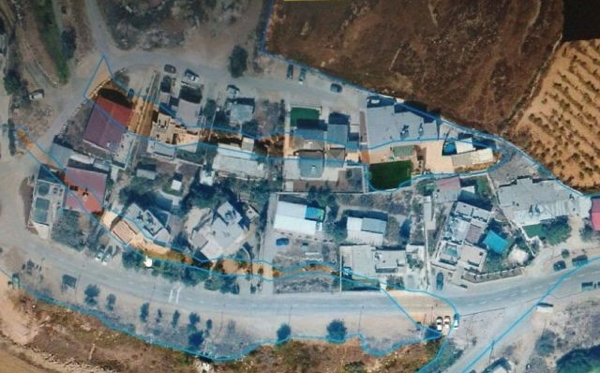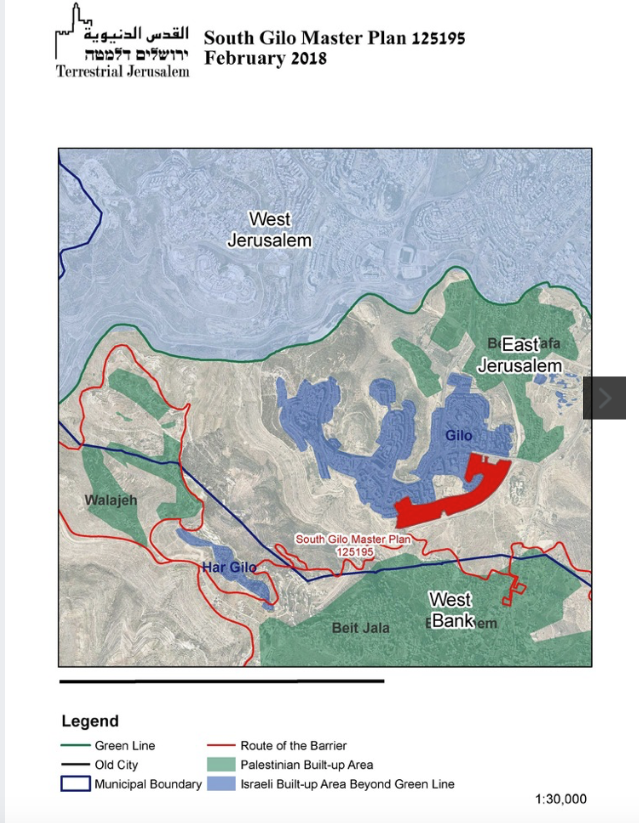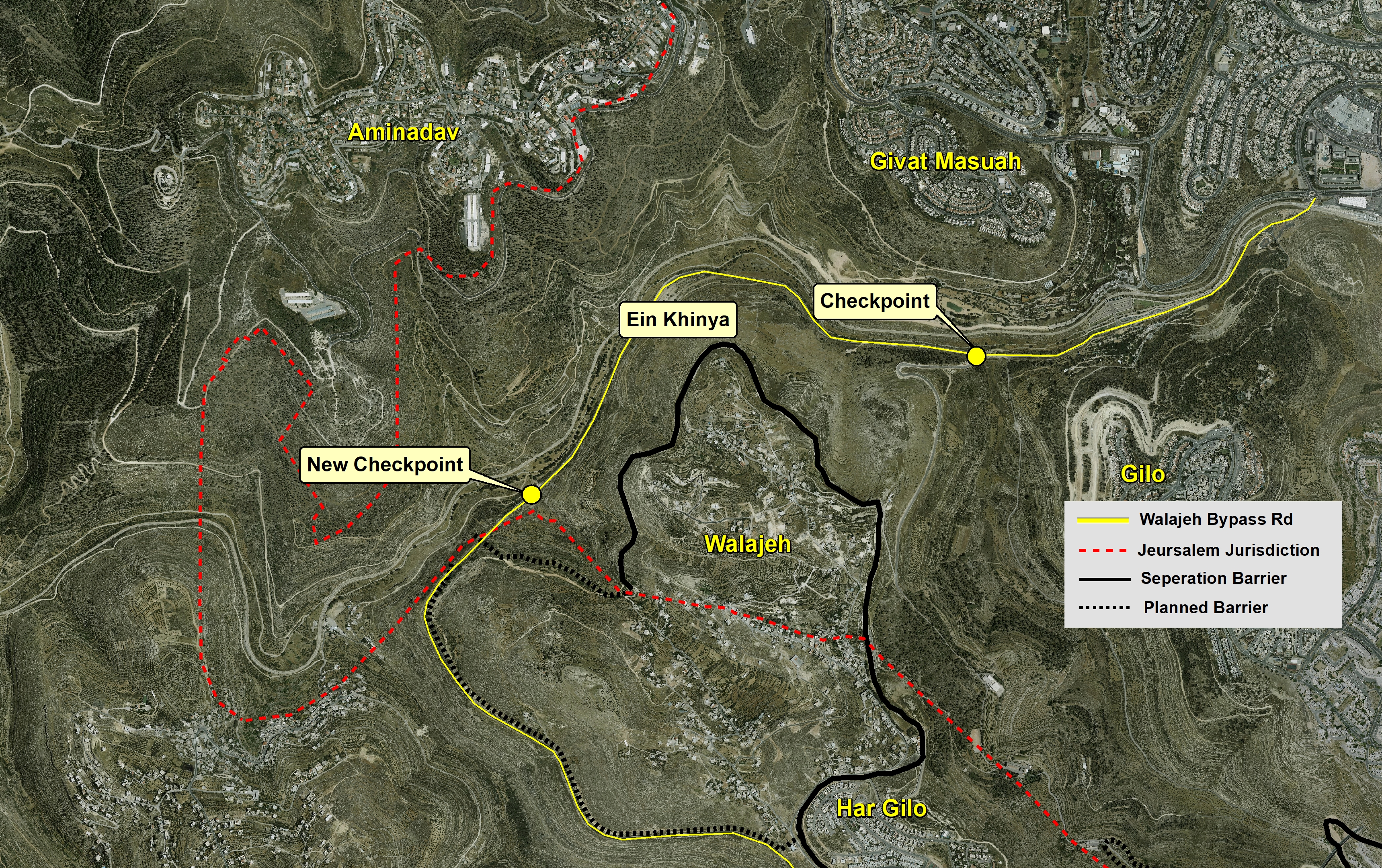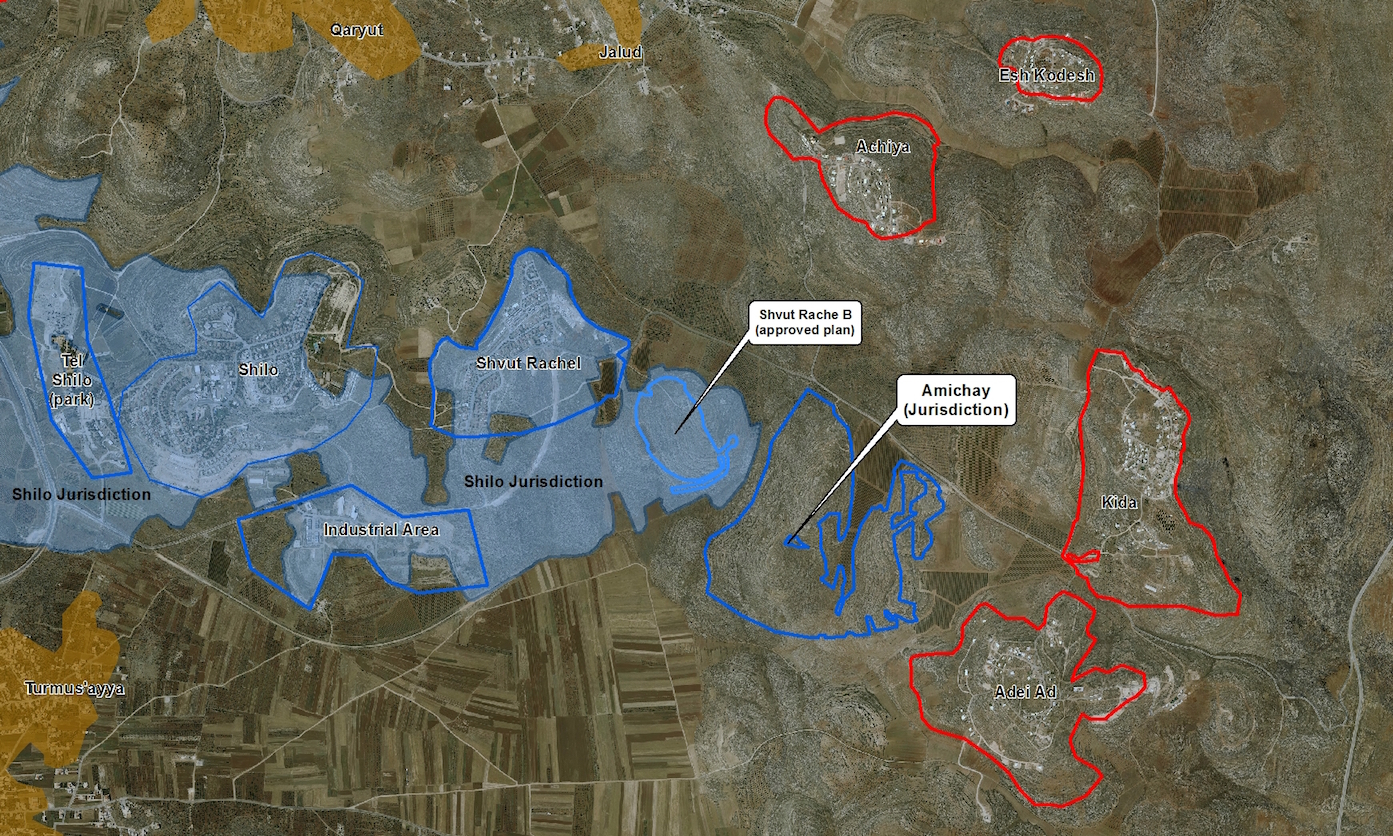Welcome to FMEP’s Weekly Settlement Report, covering everything you need to know about Israeli settlement activity this week.
To receive this report via email, please click here.
February 22, 2018
- Caravans Move Into New Shiloh Valley Settlement
- State Requests Delay of Demolitions in Netiv Ha’avot Outpost
- Process Begins for Major Expansion of Gilo Settlement in East Jerusalem
- Construction of New Checkpoint Near al-Walajah Proceeds, Despite Lacking Permit
- High Court Issues Injunction Against Construction & Sale of Homes in Shvut Rachel “Neighborhood”
- Israel Evacuates Outpost, Again
- Jordan Valley Annexation?
- U.S. Ambassador: “Settlers are Here to Stay”; Settler Leader Credits Trump for Settlement Growth
- Bonus Must-Reads
Comments, questions, or suggestions? Email Kristin McCarthy at kmccarthy@fmep.org.
Caravans Move Into New Shiloh Valley Settlement
This week, the delayed construction of the Amichai settlement in the Shiloh Valley got a temporary fix: the Israeli Civil Administration (a branch of the Israeli Defense Ministry that is the sovereign power ruling over the West Bank) began installing 36 trailers for settlers to move into while the permanent settlement is being built. The construction of Amichau has hit many snags since the government green-lighted the project. Budgetary fights led to repeated delays, and several NGOs have filed legal petitions on behalf of nearby villages whose land the settlement will steal.
As we have written about many times in the past, Amichai is the first of two new settlements approved by the Israeli government in early 2017 as pay-off to settlers forced to evacuate the Amona outpost by the High Court of Justice. That Amona outpost was established without authorization from the Israeli government and on private Palestinian land; the government of Israel fought for years to legalize it post-facto, but eventually was forced by the High Court to evacuate its residents (evacuation that some residents resisted violently). The establishment of Amichai clearly demonstrates that settler law-breaking not only goes unpunished, but is handsomely rewarded by the Israeli government, and that establishing illegal outposts is an effective route to establishing new settlements.
The Amona settlers have been some of the most vocal and demanding advocates for ever more concessions from the Israeli government, including the installation of these temporary mobile homes on their preferred site. With the approval of that demand, a spokesman for the Amona evacuees said triumphantly:
“Beyond the Regulation Law, the legalizing of thousands of homes in Judea and Samaria (West Bank), the establishment of a new settlement after decades of drought, the great thing that the people of Amona have achieved in their uncompromising struggle is a change in discourse and consciousness.”
Peace Now – which has filed one of the petitions against the construction of Amichai – said:
“42 families, which the court ruled had stolen private land, are extorting the government…”
State Requests Delay of Demolitions in Netiv Ha’avot Outpost
Two weeks ahead of the slated demolition of 15 structures in the Netiv Ha’avot outpost – structures built on privately owned Palestinian land – the state of Israel is urging the High Court of Justice to delay the demolition for three additional months. The reason? To allow more time for another outpost to be constructed for the settlers to move in to (plans for which were approved last week).

Map by Times of Israel
The delay will also allow more time for settlers to advance plans to save seven of the 15 structures ordered to be demolished; settlers have proposed saving the seven buildings by demolitioning only the parts of the buildings that sit on Palestinian land, leaving the rest intact.
While the Netiv Ha’avot settlers are trying to stay put, Israeli press reports this week suggest that Netanyahu has asked his Cabinet to approve a payout of millions of shekels to the settlers, in advance of their evacuation, ostensibly to to facilitate a public-relations friendly demolition of the targeted 15 structures. Cabinet ministers are now seeking funds from their ministry budgets to help fund Netanyahu’s Netiv Ha’avot bribe. The bribe money will come in addition to the estimated $14 million to $17 million it will cost Israeli taxpayers to dismantle the 15 structures slated to be demolished in Netiv Ha’avot.
Once again, the establishment of a new outpost for setters who built illegally on land recognized by Israel as privately owned by Palestinians, plus a huge financial pay-off to them, demonstrates clearly that settler law-breaking not only goes unpunished but is actively rewarded and incentivized by the Israeli government.
Process Begins for Major Expansion of Gilo Settlement in East Jerusalem
 Jerusalem expert Daniel Seidemann’s NGO, Terrestrial Jerusalem, reports that the Jerusalem planning authorities met on February 21st to initiate the planning process for a new neighborhood of the Gilo settlement in East Jerusalem. The plan seeks to significantly expand the footprint of Gilo in the direction of Bethlehem (the Gilo settlement literally looms over Bethlehem; the new plan will develop the southern slope leading down into the Palestinian city). The plan calls for building 2,992 new units.
Jerusalem expert Daniel Seidemann’s NGO, Terrestrial Jerusalem, reports that the Jerusalem planning authorities met on February 21st to initiate the planning process for a new neighborhood of the Gilo settlement in East Jerusalem. The plan seeks to significantly expand the footprint of Gilo in the direction of Bethlehem (the Gilo settlement literally looms over Bethlehem; the new plan will develop the southern slope leading down into the Palestinian city). The plan calls for building 2,992 new units.
Terrestrial Jerusalem writes:
“In 1995, Israel made a commitment to the U.S. government that no additional land in East Jerusalem would be expropriated for the purposes of building or expanding settlement neighborhoods. That commitment has guided the boundaries of Israeli settlement expansion in East Jerusalem in the ensuing years. While the scope of the expropriations under this scheme will be limited, this significantly contravenes the spirit of that undertaking, significantly expanding the built-up footprint of the Gilo settlement.”
Ir Amim writes:
“The Gilo Southeast plan is yet one more link in a chain of developments designed to seal off the southern perimeter of East Jerusalem from the West Bank, nullifying prospects for a two state solution. Advancing a new plan for 3,000 units on land near Givat Hamatos indicates that the Israeli government will continue to do everything just short of taking action on Givat Hamatos to fill in any remaining gaps along the southern flank of the city.”
Construction of New Checkpoint Near al-Walajah Proceeds, Despite Lacking Permit

Map by Peace Now
The Jerusalem Municipality recently began (and has nearly completed) the construction of a new checkpoint that will further isolate and imprison the Palestinian city of al-Walajah, which is surrounded on three sides by the Israeli separation barrier. The construction of the checkpoint is going ahead despite the fact that it lacks the legally required permit and in contravention of an Israeli court order.
The new checkpoint is meant to replace the current one, located further down the road. The current arrangement allows al-Walajah residents to access an important and historic natural spring without passing through a military checkpoint. The new checkpoint will block the village’s access to the spring and it will advance the consolidation of Israeli control of the village’s only remaining access point to Jerusalem.
Terrestrial Jerusalem provides background on the spring, which is now inside of an area Israel has declared an Israeli national park, and Israeli actions to consolidate control over it:
“The move comes as part of the Municipality’s decision, supported by the government, to designate the area as an Israeli national park. The decision to move the Ein Yael checkpoint is designed, deliberately, to prevent el-Walajeh’s resident from accessing the park (for further background on the national park project, see our previous report here). Following the inauguration of the area as a national park by Jerusalem Mayor Nir Barkat and Tourism Minister Ze’ev Elkin (Likud), construction works for the relocation of the checkpoint started on February 12, 2018, without a permit being issued and in contravention of a court order requiring the Municipality to suspend all work in order to enable el-Walajeh’s residents to appeal the Municipality’s decision.”
Ir Amim further explains the drama that ensued when the Jerusalem Municipality began the construction illegally, against the orders of the court:
“On February 12, the District Committee approved a permit for construction, rejecting separate objections from residents of Al-Walaja and the Har Gilo settlement. Despite the committee granting a week for the attorney for the residents of Al-Walaja to submit an appeal, the Municipality – which initiated and is funding the multi-million shekel project – launched construction two days later. The director general of the Municipality, Amnon Merhav, personally supervised the illegal construction, refusing to halt the equipment when confronted by the residents’ attorney and Ir Amim field researcher, Aviv Tatarsky. Tatarsky was arrested and jailed on his way to work the following morning for disrupting the peace.”
Peace Now adds even more color to the late-night legal proceedings and wacky defenses that the Jerusalem Municipality deployed in order to continue the construction. In the end, the presiding judge decided to nullify the 1-week injunction to allow the construction to proceed, a ruling that accepted the Municipality’s argument that stopping the construction would endanger motorists. The judge will hear complaints filed by al-Walajah residents on March 6th.
High Court Issues Injunction Against Construction & Sale of Homes in Shvut Rachel “Neighborhood”
On February 18th, the High Court of Justice issued an injunction freezing the construction and sale of new homes in the Shvut Rachel “neighborhood” of the Shiloh settlement. Importantly, Shvut Rachel is not actually a neighborhood of Shiloh: it is located outside of Shiloh’s boundaries and is correctly termed an illegal outpost. The injunction follows a petition launched by Peace Now against the illegal construction, filed at the end of January 2018. This is not the first time Peace Now has challenged illegal/unauthorized construction in this area. The first such petition was filed in 2010, but the illegal construction was nonetheless allowed to advance in fits and starts, with the government of Israel fully aware of the crime. Now, the project is nearly complete and ready for sale. And once again, the actions of the Israeli government in allowing the illegal construction to reach this point demonstrate that settler law-breaking not only goes unpunished but pays off.
Israel Evacuates Outpost, Again
The Israeli army removed settlers from an encampment set up near the Tapuah settlement in the northern West Bank, just south of Nablus, as they have done several times over the past 5 years. Settlers reacted violently – throwing stones, burning tires, and pouring oil on roads – in order to deter the Israeli army’s dismantlement of the mobile home camp. Two Israeli youths were arrested in the incident.
After the army left, the settlers marched towards the nearby Tapuah settlement, encountering and attacking two Palestinian vehicles and a Rabbi for Human Rights activist along the way.
Jordan Valley Annexation?
The settler-aligned Arutz Sheva media outlet is reporting that the Ministerial Committee for Legislation (a committee of Cabinet members who decide if the government will support legislative proposals) will consider endorsing a bill to annex the Jordan Valley at its weekly meeting.
The bill was introduced by Likud MK Sharren Haskel, who recently said:
“The support we are receiving in the international arena from our friend the United States proves that there has not been and will not be a better time…With the support of the Likud members who demand the necessary change, with the support of the government where we have the majority needed to pass the bill, together with my friends Motti Yogev and Miki Zohar, I am proud to lead the bill to apply Israeli law in the Jordan Valley”
The Arutz Sheva report suggests the Netanyahu might block the bill from coming up for a vote (a suggestion that is likely part of the effort to pressure Netanyahu not to block it). The same report notes that the Likud-inspired annexation bill will be postponed for cabinet consideration for another week.
U.S. Ambassador: “Settlers Are Here to Stay”; Settler leader: “thank God” for Trump
Veteran Haaretz columnist Barak Ravid reported remarks made by U.S. Ambassador David Friedman during a meeting with the Conference of Presidents of Major Jewish American Organizations earlier this week. Friedman reportedly said that Israeli settlements will not need to evacuated under a U.S. peace plan, noting specifically, “the settlers aren’t going anywhere.” Given the public record of Friedman’s policy positions, this is not a surprising statement or U.S. policy manifestation.
Notably, the Trump Administration (White House and State Department) offered no substantive correction.
At the same time, the Associated Press ran a story this week (which got picked up by several major outlets including the Washington Post, TIME, ABC News, and Voice of America) quoting the braggadocious remarks of settler leader, Yaakov Katz. Katz has ties to a prominent settler organization, “Bet El Institutions,” which, as noted by Haaretz, has ties to U.S. negotiators (as in, David Friedman was the longtime leader of the U.S. fundraising arm of Bet El, and both he and the Kushner family have donated to Bet El). Hailing the “success” of the settlement enterprise in 2017, Katz quipped:
“This is the first time, after years, that we are surrounded by people who really like us, love us, and they are not trying to be objective…We have to thank God he sent Trump to be president of the United States.”
Katz also said (among other things):
“We are changing the map. The idea of the two-state solution is over. It is irreversible.”
Katz’s excitement is a marked contrast from the January reaction of the Yesha Council (the umbrella organization of municipal councils of Jewish settlements) to 2017 population growth data. The Yesha Council lamented declining growth in settlements and blamed it on what a purported “quiet freeze” on settlement construction in 2017, despite the fact that Peace Now chronicled an alarming acceleration of settlement activity in 2017.
As FMEP explained in January, 2017 Israeli government data (covering 150 West Bank settlements and outposts, but not East Jerusalem) shows that the settler growth rate has decreased for the sixth consecutive year, from 3.9% in 2016 to 3.4% in 2017 (the growth rate hit a high in 2008, at 5.8%). Even with this decline, the 3.4% settler population growth rate still outpaces Israel’s national average, which comes in at 2%. Moreover, the data show that settler population is far younger than the population inside the Green Line, with 47% of settlers being below the age of 18, compared to 27% of Israelis inside the Green Line.
Bonus Must-Reads
- “Israel’s Latest Attempts to Alter Geopolitical Realities in Jerusalem” (Al-Shabaka) *This is a short policy memo drawing from a brief which will be published in March 2018.
- “The End of Israel’s ‘Enlightened Occupation’ “ (+972 Mag)
- “Netanyahu’s Real Crime: Plundering Land from Palestinians” (Al-Monitor)
- “Netanyahu’s West Bank Annexation Talk Was No Gaffe” (American Conservative)
FMEP has long been a trusted resource on settlement-related issues, reflecting both the excellent work of our grantees on the ground and our own in-house expertise. FMEP’s focus on settlements derives from our commitment to achieving lasting Israeli-Palestinian peace, and our recognition of the fact that Israeli settlements – established for the explicit purpose of dispossessing Palestinians in the West Bank and East Jerusalem of land and resources, and depriving them of the very possibility of self-determination in their own state with borders based on the 1967 lines – are antithetical to that goal.
